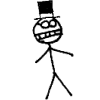Only Dust and a Plaque
| This content has been retired and is no longer available in game. |
As you're stalking through the cemetery, you hear a "Wooooooah!" coming from above and behind you. You wheel around and see a tombstone shaped like an angel holding open a book. Ordinarily, that'd be classy and arty, but this book appears to be a dirty magazine.
Anyway, the yell you hear dopplers down to you, followed closely by a tall skleleton wearing a tuxedo and a tophat!
The skelelton crashes into the angel's open book, then reclines over it, morose. "What have I done?" he asks. "All I really wanted was to give people something great! But the stupid skydiving company didn't give me a parachute! I guess I shouldn't have picked "Bob's House of Budget Jumpin' Outta Planes."
He sits up and takes stock of himself. "Looks like I'm okay, though, thank --" and every bone in his body becomes unhinged, the footbone unconnecting from the anklebone, the anklebone from the kneebone, and so on. Then the angel falls on top of the pile of bones.
You sweat and strain, and move the statue. All you can find of the skeelton, unfortunately, is his skull. Which, y'know, is somewhat less unfortunate for you than him.
Your ten-leaf clover disappears in a puff of smoke.
| You acquire an item: smart skull |
| You gain 15 Muscleboundness. |
Occurred at The Unquiet Garves with a ten-leaf clover in your inventory.
References
- The lines "What have I done?", "All I really wanted was to give people something great!" as well as the title "Only Dust and a Plaque" are all from the song "Poor Jack" in Tim Burton's The Nightmare Before Christmas. The song occurs immediately after Jack Skellington, while impersonating Santa Claus, is shot down by military cannons and falls on a statue of an angel holding a book.
- The part about the bones unconnecting is a reference to the song "Dry Bones".
- "Dopplers" isn't really a word, but refers to the Doppler effect, which causes a sound to change in pitch as its source moves toward or away from the listener.

